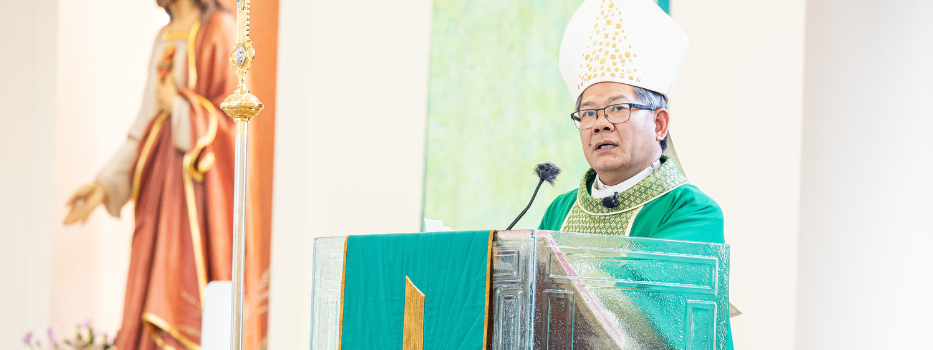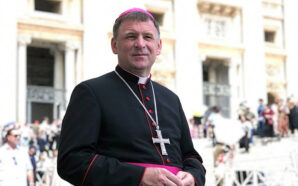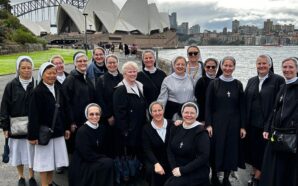Most Reverend Vincent Long Van Nguyen OFM Conv DD STL, Bishop of Parramatta
Homily for the 33rd Sunday in Ordinary Time, Year B
Readings: Daniel 12:1-3; Hebrews 10:11-14; Gospel: Mark 13:24-32.
Discerning and responding to what God is doing in the world
Dear sisters and brothers,
Today, we joyfully gather to give thanks to God for the gift of this faith community at Riverstone, which began some 120 years ago, which made this church one of the oldest in Parramatta. Actually, the earlier weatherboard building was opened 1882 and was subsequently demolished. The blessing and laying of the Foundation Stone Ceremony of the present church was reported to be quite a spectacle. Cardinal Moran arrived by train at Windsor. He was met by Fr McDonnell, the parish priest, and they were taken by a horse-drawn carriage. All the coaches were in the procession and were crowded with passengers, between Windsor and Riverstone buggies and sulkies joined in until the procession was half a mile long. Those were the good old days.
From its humble beginnings with no more than a small church, it grew into a vibrant place of worship, transformation and witness. Here, generations of Catholic faithful have lived out their call to be a sign of God’s presence and an oasis of faith, hope and love. This community through its commitment to Catholic education, support and outreach has made a difference to so many families and individuals. Together, let us continue to become the Church that Pope Francis described as a place where everyone can feel welcomed, loved, forgiven and encouraged to live according to the Gospel.
We are near the end of the liturgical year. Scriptures for this period often speak about the need to discern and act with courage, faith and hope in times of uncertainty, upheaval and chaos. The end time is a time of purposeful discernment, intentional and engaged discipleship. Crisis awakes in the disciples a sense of deep listening that leads to alignment with God’s will and courageous action. It is an opportunity for us to give joyful witness to what we believe.
In the first reading, we hear the prophecy of Daniel regarding divine judgment at the end time. The Book of Daniel was written during the great turmoil in Israel. The foreign ruler Antiochus was ruthless in enforcing imperial rule. He outlawed many Jewish traditions and erected the statue of Zeus in the temple. This led to the revolt by the Maccabees and many terrible things occurred.
It was out of this context that Daniel, the Jewish hero, came onto the scene. He was a symbol of resistance and a model of faithfulness. He reassured the people that God would see justice done in the end despite evidence to the contrary. The just would rise to everlasting life while the wicked to shame and disgrace. Like the Book of Job, Daniel contains a deeper understanding of the life of faith which goes beyond the temporal blessings of longevity, prosperity and posterity.
In the Gospel, Jesus tells his disciples to be alert to what is going on around them and not to lose the apocalyptic vision that he alone offers. He speaks of the signs of the apocalypse such as the sun would be darkened, the moon would lose its brightness and so on.
In their historical context, these signs refer to such events as the destruction of the temple, the persecution of Christians and their expulsion from much of Palestine. In fact, earlier in the same chapter, Jesus has predicted that “not a stone will be left on another”. He has warned his disciples not to be dazzled by the grandeur of the temple and instead to look for God beyond man-made symbols to the deeper reality of where God inhabits.
“Take the fig tree as a parable”. With this, Jesus invites us to look for signs of new life where it is less apparent and perhaps less seductive. He cautions us to see more than what meet the eye. Salvation will not come from where people say it is. It will not be in fear, resentment and hatred. Nor will it come from the false security, wealth and fame. Instead, the apocalyptic vision Jesus offers us is quite unambiguously counter-intuitive and counter-cultural. It goes against the grain of human nature and the prevalent attitude of society.
Dear friends,
We give thanks to God for 120 years of our history here at St John’s. We give thanks for such a rich tapestry of faith that has been woven by generations of faithful, generous and committed parishioners. In the awareness that God makes great things happen through our humble but tenacious faith, we commend our future into his hands.
Our celebration today is a time of gratitude, trust and joyful hope in the future. We are grateful for what has been achieved. But we are also confident of a hope-filled future knowing that God will bring the triumph of love out of the pain we bear. May we become catalysts for renewal and transformation through our commitment to and engagement with the Gospel values. Let us learn the art of living deeply in God’s love, attentive to his presence and responsive to his call. Then we can truly be the conduit of mercy and the sign of hope for all. As true believers, we can do well to be responsive to God’s action in the world so that the day of the Lord may be a source of vindication, comfort and joy to us.








